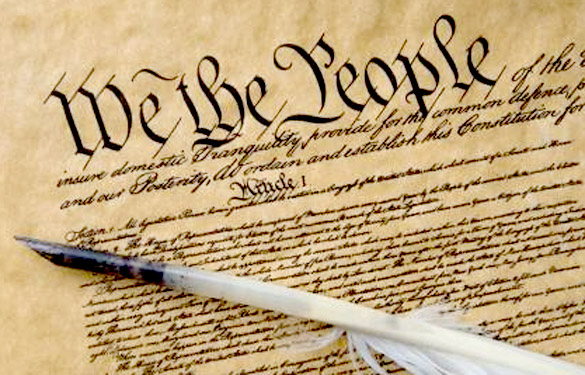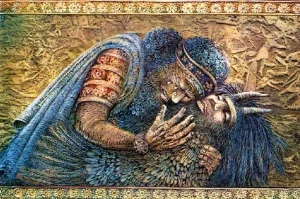Every year there are dozens of scholarly books and articles that are published describing the founding period of the United States. The debate between Federalists and Anti-Federalists over the ratification of the Constitution is one of the topics often discussed. Both the Federalists and the Anti-Federalists presented arguments that have had profound effects on subsequent American history. It is important for us to learn the full nature of their debate and how it has influenced our views on American government.

“Nothing is more certain than the indispensable necessity of government, and it is equally undeniable, that whenever and however it is instituted, the people must cede to it some of their natural rights in order to vest it with requisite powers.”1 Federalists, the supporters of the Constitution, had the support of some of the most prominent men in America, including Benjamin Franklin and George Washington. Moreover, prominent political philosophers of their time, such as Alexander Hamilton, James Madison, and John Jay, published a series of essays under a pseudonym “Publius.” These essays were widely published in newspapers throughout the nation. They explained the meaning and the virtues of the Constitution and countered the powerful arguments of the opposing side. Today, they are known as The Federalist Papers. These documents are important American contributions to modern political theory.2

Patrick Henry, a famous Anti-Federalist, was well known for his quote, “I know not what others may choose but, as for me, give me liberty or give me death!” In order to combat the attention given to those who had different opinions, the Federalists deemed their opponents as “Anti-federalists,” giving the message that individuals that were not associated with the Federalists had nothing to offer besides negative opposition and chaos. However, Anti-Federalists did have serious and intelligent arguments of their own. They presented themselves as the loyal defenders of the principles of the Revolution. Moreover, they believed that the Constitution would betray the principles of freedom by establishing a tyrannical central power in the new government.
The main claims of Anti-Federalists were that a federal government would make unfair distinction among the citizens, raise taxes, abolish the states, and end individual liberties.3 According to them “the constitution was the basic mistrust of human nature and the capacity of human beings to wield power.”4. They believed the Constitution lacked a much needed Bill of Rights, a concern that became one of the most important sources of their opposition, with at least nine out of ten Anti-Federalists wanting a written Bill of Rights.5

At the heart of the debate between Federalists and Anti-Federalists was a battle between two fears. The Federalists were afraid of disorder, anarchy, and chaos; they believed that a constitution would prevent these catastrophic events. The Anti-Federalists were not anarchists and they too recognized the need for an effective government; they believed that the greatest threat to the future of the United States was the government’s potential to become corrupt and seize more power until its tyrannical hand stretched across the country and completely dominated the citizens.6
Despite the Anti-Federalist efforts, the Constitution was ratified in 1790, but during the ratification debate, Madison conceded that a bill of rights was needed. Federalists assured that the first step of the new government would be adopting a bill of rights.
- John Jay, Federalist Papers no 2, (1787), 1. ↵
- Alan Brinkley, American History: Connecting with the Past Volume 2, 15 edition (New York: McGraw-Hill Education, 2014), 145. ↵
- Alan Brinkley, American History: Connecting with the Past Volume 2, 15 edition (New York: McGraw-Hill Education, 2014), 146. ↵
- Alan Brinkley, American History: Connecting with the Past Volume 2, 15 edition (New York: McGraw-Hill Education, 2014), 146 ↵
- Main T. Jackson, The Antifederalists: Critics of the Constitution, 1781-1788 (New York: W.W. Norton, 1974), 159. ↵
- John H. Aldric and Ruth W. Grant, “The Antifederalists, the First Congress, and the First Parties,” The Journal of Politics, vol 55 no. 2 (1993): 295. ↵



71 comments
Vianey Centeno
This essay, in my opinion, was really well worded and detailed. The profundity of this post is one of the things I particularly like. The other Federalist and anti-federalist essays I’ve seen have all merely reiterated the most well-known information that the majority of readers are already aware of. This piece, however, delved into further detail and provided additional insight into the disputes between the major parties.
Rafael Portillo
Mr. Samuk, thank you for this article. I was able to understand both sides more clearly. Who knew that anti federalists were not actually aggressive and wanting chaos. They had actual beliefs that wanted to give others rights and freedoms. The wording was well thought out too. I was able to understand the concept pretty well.
Emily Rodriguez
I believe this article was explained in a very detailed yet easy-to-follow way. The author did a great job explaining the main differences between the two parties and what they believed in. This was a great comparing and contrasting of the two and the reading flowed in a way where I never felt lost. I also think that the pictures are placed in a significant way in relation to what is being talked about in the article. Good job!
Jace Nicolet
The federalists vs the anti federalist was a big question everyone was pondering about back them. For one side the federalists wer happening for a stronger central and national government who would improve relation between states. While anti federalists were more hesitant because they know that if a central government has too much power than they would default to tyranny like england did tp them.
This has to do with what we are learning about because we are currently talking about the come up of the states and the politics that go along with it. This also ties into early america and what the colonists think of their own government. This could also be related to how england treated their colonists who lived in early America and how that has shaped our government today.
This article is a vert good sized because usually i would get bored or drained with longer articles. I like how this was straight to the point and also made me learn new things about the topic that i have not before. The Author also does a good job making sure i can have a sense for the setting with pictures of the meetings and documents that have to do with the federalist and anti federalists
Alia Hernandez Daraiseh
This article was so intriguing to read, it honestly made more sense to me now reading it than it ever has been in high school. I really liked how Samuk broke the Federalists and Anti-Federalists down, and gave clear and concise information that has led me to a clear understanding of what was happening. It is also interesting to learn about what each group stood for, and how they both in turn wanted similar, yet different values.
Erica Mata
Overall, I found this article super important since it does dive into a deep meaning of how a certain debate has influenced the way we see the American government. I liked the fact that it gave differences between the anti-federalists and the federalists based off of what they believed. In addition, I also found interesting how before they were known as The Federalists papers they were just known as essays.
Alexandra Camarena
I thought this article was very well written and explained. One of the things that I really like is how in-depth this article was. All the other articles I’ve read covering the Federalists and anti-federalists just stated the most popular facts that most people already know. However, this article went more in-depth and gave further insight into the arguments between the political parties.
Dylan Vargas
The article gives me a clear idea of how the Federalists and the Anti-Federalists saw the creation of the Constitution. The way that the different groups debated and what was their arguments, it is all shown or explained. It gives me the image of what they are talking about and why they are talking about it. Giving two points to think off of, then explaining what they did at the end of the day. the article gives great information if needing it for a research project.
Laura Poole
This is a very thorough article. I especially like the image of the founding fathers all together. I wonder what it felt like to be in that room, anxiously trying to write a document for this new found country. I think you were able to paint the picture of this tense time very well. It is wild to think that this was the birth of America.
Vanessa Fabila-Ramirez
Readindg this article really helped me see the different bewteen the Federalists and Anti-Federalist. After reading the article I can understand why the Anti-Federalists believe it unfair. Not everyone can be able to pay for taxs if they get higher. I uderstand why they are both scared but if they just took a moment to stop and think. They could have been so much better together, instead of being separate. In the end it was ment to happen and we got the Bill of rights.